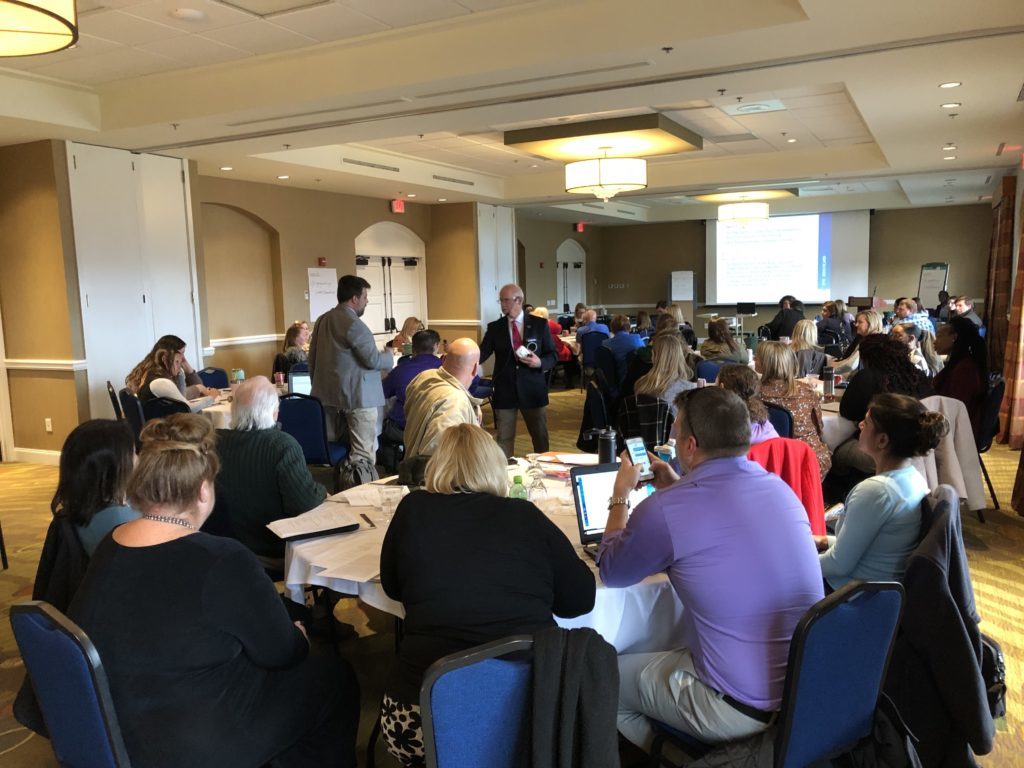- Total attendees to date: 1300
- Counties represented at MDCANI trainings to date: 50
- Percentage of Georgia population in represented counties: 57.56%

We all talk a lot about system change. In fact, our child welfare legal system can be described as a system that is about system change in families. And anyone with experience in this system understands that it is very difficult to create the conditions for change in families if everyone in the family has not bought in. We’ve all experienced the frustration of trying to work on change in a family dynamic when one or more of the necessary parties are not present. We’re frustrated because we know by experience what’s needed for successful change in families: an honest assessment of strengths and weaknesses; a plan (developed with participation by all parties) that sets forth realistic and attainable goals; a data-driven measure of progress; and mutual accountability. Silos are for storage – not for growth.
And yet we accept siloed approaches as the norm in our work on our own child welfare legal system. We have our conversations and conduct our training in a sort of isolation: there are trainings for judges, trainings for attorneys, trainings for agency staff, trainings for CASAs and other guardians ad litem. Each constituency has its own concerns, its own goals, and its own way of measuring success (usually more by intuition than by evidence).
As the major organizer and funder of statwide trainings in Georgia, the Georgia Supreme Court Committee on Justice for Children (our state CIP program), in consultation with the judges who make up our Court Improvement Initiative, made a decision to move away from support for siloed training toward a multi-disciplinary approach with a univocal best-practices message. One of the major components of this new approach is our Multi-Disciplinary Child Abuse and Neglect Institute (MDCANI)
Modelled on the Child Abuse and Neglect Institute of the National Council of Juvenile and Family Court Judges, MDCANI is an intensive, two-day training in every aspect of a dependency case, wholly informed by nationally-accepted best practices. The first iteration of MDCANI deals with the first 75 days of a dependency matter, from the decision to remove a child through the initial review hearing. The second iteration (now in the planning stage) will address the issues which arise from initial review through the final order which closes the case.
Because many people throughout the state find it difficult to come to Altanta or to other centralized trainings, and to ensure that we have involvement from all classes of stakeholders, we bring MDCANI to the local jurisdictions. Ideally, we train two jurisdictions together so that even the local practices of a particular jurisdiction are open to discussion. We have judges, attorneys, agency staff, CASA and other GALs, and other professional participants together in the same room for two days of intensive training and conversation.
We begin our discussion with an overview of federal legislation and of the foundational constitutional liberty interest in family integrity. Reference is made to this material throughout the training. We also present detailed data that takes us beyond what stakeholders think about how they’re performing by looking objectively at local and statewide outcome measures. Because we can tell participants what their data are, but not why their data measures look like they do, this module forms the basis for frank conversations about local practice. And because we have everyone present in the same room, there is a high level of mutual accountability. At the close of the training, we ask participants to identify steps to improve practice in their jurisdictions.
Since Fall of 2017, we have provided MDCANI to jurisdictions representing over 50% of our statewide population. And though we have not had sufficient time to do a thorough study of outcomes in these jurisdictions, we hear from participants that these trainings are changing practice in their courts.
Article authored by Judge Michael Key and Jerry Bruce, co-lead faculty for MDCANI. Judge Key is the Juvenile Court Judge for Troup County, Georgia, and a past president of the National Council of Juvenile and Family Court Judges. Jerry Bruce is a former Juvenile Court judge and the director of Georgia’s CIP program.